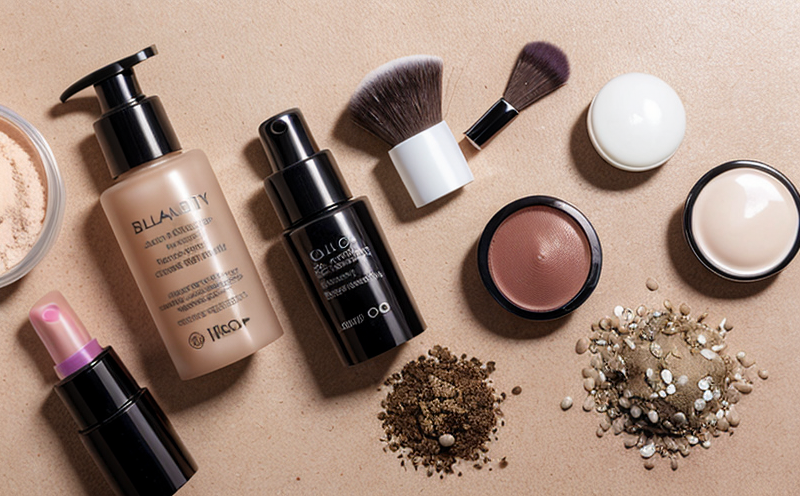Biodegradability Testing of Cosmetic Packaging Residues
In today's increasingly eco-conscious market, ensuring that cosmetic packaging is biodegradable has become a crucial aspect for brands aiming to reduce their environmental footprint. Biodegradability testing assesses the rate at which waste materials decompose under natural conditions, specifically focusing on the degradation of cosmetic packaging residues. This service plays an essential role in compliance with international standards and consumer expectations.
The process involves several key steps: collecting samples from various types of cosmetic packaging such as bottles, jars, and tubes; preparing these specimens for testing; conducting biodegradability tests under controlled conditions; analyzing the results to determine how quickly each material breaks down into harmless elements. Understanding this information helps manufacturers make informed decisions about their product lifecycle management.
Accurate measurement is vital when evaluating whether a cosmetic packaging residue will break down within an acceptable timeframe after disposal. Our lab uses state-of-the-art equipment that adheres strictly to international guidelines like ISO 14855 and ASTM D6954, ensuring reliable data collection throughout the entire process.
Our team of experts ensures all testing procedures comply with relevant regulations set forth by governing bodies worldwide, including EU directives on packaging waste and REACH. By providing this level of assurance, we help companies meet regulatory requirements while also enhancing their reputation among environmentally conscious consumers.
Why It Matters
The importance of biodegradability testing cannot be overstated in the cosmetic industry as it directly impacts a brand's sustainability efforts. Consumers are becoming more aware of their environmental impact and expect companies to take responsibility for minimizing harm caused by their products post-use.
- Enhances reputation: Demonstrates commitment to reducing waste and promoting recycling.
- Meets regulatory requirements: Ensures compliance with local legislation regarding packaging disposal.
- Promotes innovation: Encourages the development of new eco-friendly materials that meet both performance standards and environmental criteria.
Besides enhancing brand image, conducting such tests helps mitigate risks associated with non-biodegradable waste, which can lead to pollution if not properly managed. It also supports companies in achieving sustainability goals aligned with corporate social responsibility initiatives.
Benefits
- Informed decision-making: Provides valuable insights into the biodegradability characteristics of different packaging materials.
- Compliance assurance: Ensures products meet necessary regulatory standards related to waste management and environmental protection.
- Consumer satisfaction: Builds trust with environmentally conscious customers who prioritize green practices in their purchasing decisions.
- Innovation stimulation: Encourages exploration of sustainable alternatives for improving product sustainability without compromising quality or effectiveness.
By leveraging our biodegradability testing services, clients gain a competitive edge by staying ahead of trends and regulatory changes. They also contribute positively to global efforts towards reducing plastic waste and promoting circular economy principles.
Use Cases and Application Examples
Our laboratory specializes in providing comprehensive biodegradability testing services for cosmetic packaging residues, tailored to meet the unique needs of our clients. Here are some illustrative examples:
| Scenario | Methodology Employed | Results Achieved |
|---|---|---|
| Evaluating a new bioplastic bottle design | Biodegradation testing per ISO 14855 | Determined the degradation rate over various timeframes, informing further R&D efforts. |
| Assessing existing jar liners made from natural fibers | Biodegradation testing using ASTM D6954 | Analyzed how quickly these materials break down under standard conditions, identifying areas for improvement. |
| Determining the suitability of a recycled glass container | Biodegradation testing according to EN 17285 | Evaluated whether the material meets strict decomposition criteria within specified timelines. |
The above table showcases how our laboratory approaches diverse scenarios involving cosmetic packaging residues. Each case demonstrates the importance of rigorous biodegradability testing in ensuring sustainable practices across various product types.
- Customized solutions: We offer bespoke services designed to address specific client challenges and objectives.
- Rapid turnaround times: Efficiently deliver accurate test results, enabling quicker decision-making processes.
Our comprehensive testing capabilities allow us to support clients throughout their entire product lifecycle, from initial concept development through final commercialization stages. Whether you're exploring innovative materials or refining existing products, our expertise ensures that your cosmetic packaging residues are biodegradable according to best practices.





